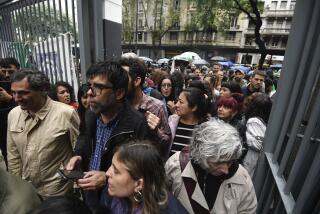Polish Bureaucracy Slashed at 2nd Parliament Session
- Share via
WARSAW — Twelve ministers lost their jobs and 16 government departments were cut to eight on Saturday in the biggest postwar overhaul of Poland’s central government, aimed at revitalizing key economic sectors and loosening central control.
The changes, approved by the Polish Parliament on the second day of a session devoted to reform, are part of a plan to dismantle many of the controls that have strangled the economy and to “liberate enterprise” with greater emphasis on self-management, initiative and productivity.
Designed to slash government bureaucracy and speed up economic reforms, the changes mean the biggest overhaul of central government in Poland since the Communist Party took power after World War II.
The duties of 16 government departments have been shifted or merged into eight new “super ministries” that will supervise key sectors such as energy, industry, construction and education.
Twelve government ministers lost their jobs and several others were transferred, and the number of deputy premiers was reduced from five to three.
Wladyslaw Gwiazda, whose former job as a deputy premier included overseeing exports, is to take over an expanded Foreign Trade Ministry, with the job of ensuring greater export earnings crucial to Poland’s economic recovery.
Senior government economist Zdzislaw Sadowski, who is the main architect of Poland’s economic reform program, became head of the Planning Commission responsible for drawing up economic targets. Sadowski is known to favor market solutions and decentralized planning. He also retains his post of deputy premier, which he took up earlier this year.
Jerzy Bilip, the director of the model Polkolor television factory outside Warsaw, who has considerable expertise in electronics and management experience, takes over a newly created Ministry of Industry.
Bogumil Ferensztajn, the top Communist Party official in the industrial power base of Katowice, in southern Poland, will tackle Poland’s acute housing problem as head of a new Ministry of Urban Development and Building.
Henryk Bednarski, who was responsible for ideology in the Communist party structure, in particular science and education, takes over the Education Ministry
The hurried passage of the reshuffling seemed to cause an unusual display of rebelliousness among Parliament deputies.
In the case of naming little-known medical professor Janusz Komender to be minister of health, there were 17 negative votes and 80 abstentions. Normally there are fewer than 10 “no” votes or abstentions.
Official newspapers, meanwhile, bannered the announcement of the two questions to be put to voters in a referendum, which the Parliament approved on Friday. The ballot, to be held on Nov. 29, asks Poles whether they will put up with up to three years of economic austerity for the sake of long-term prosperity and some political liberalization.
The plans usher in the second stage of an economic package launched after the suppression of the Solidarity free trade union under martial law in 1981.
Meanwhile, Solidarity leader Lech Walesa, in his first comment on the questions posed in the referendum, said they were phrased in a way that was meaningless.
“Simply, you cannot answer the questions in a different way. Every normal person must say, ‘Yes,’ ” he said. “This is an unfair game.”
Walesa said it is unlikely that the outlawed Solidarity labor federation would call for a national boycott of the referendum, but he privately considered the planned vote “a waste of time.”
“I just wonder that one significant question was not mentioned: Do the Poles want to breathe socialist air?” Walesa said, speaking from his home in Gdansk.
More to Read
Sign up for Essential California
The most important California stories and recommendations in your inbox every morning.
You may occasionally receive promotional content from the Los Angeles Times.













